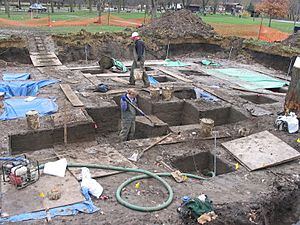Anthropology facts for kids

Anthropology is the study of human beings. The word "anthropology" comes from two Greek words: "anthropos," meaning "human," and "logy," meaning "the study of." So, anthropology is all about understanding people!
Anthropology is a social science that combines ideas from biology and history. It helps us learn how groups of people around the world are alike and how they are different. Anthropologists do research in many places. They study how people live today and how they lived in the past, often using Archaeology. They might research in big cities, small villages, or even in the countryside. They look at how different groups of people think about things like time, space, and life.
There's also something called applied anthropology. This is when anthropologists use what they've learned to help people solve real-world problems. For example, they might help communities bring back old, successful farming methods. Or they might help teach young people the languages of their ancestors, especially if those languages are close to disappearing.
Anthropology is usually divided into four main areas:
- Archaeology - This is the study of how people lived in the past. Archaeologists learn by digging up and studying things people left behind. These can be anything from pottery and stone tools to old buildings or even ancient trash!
- Physical anthropology - This area focuses on human biology. It looks at how our bodies have changed over time (this is called evolution). It also studies how people adapt to different environments. Physical anthropologists also study non-human primates, like monkeys and apes, to learn more about our own origins.
- Linguistic anthropology - This is the study of human language. It explores how languages develop and evolve over time. Linguistic anthropologists also look at how language shapes what people think and how people, in turn, change their language.
- Cultural anthropology - This part of anthropology studies how people live their lives now and how they might have lived in the past. This includes looking at the tools they used, the food they ate, and their customs and beliefs. Cultural anthropology is closely related to sociology (the study of societies) and social psychology (the study of how people think and behave in groups).
Most people who study anthropology learn a bit about all four areas. But usually, they choose to specialize in one or two areas for their main research.
Understanding Human Biology
Biological anthropology, also known as physical anthropology, is a key part of understanding humans. It focuses on how humans have changed over millions of years. This field helps us see how our bodies adapted to different environments and how we are connected to other living things.
Notable Anthropologists
Many important people have contributed to the field of anthropology. Here are a few:
- Fredrik Barth
- Franz Boas
- Robert Broom
- Raymond Dart
- Mary Douglas
- Eugène Dubois
- Zora Neale Hurston
- Claude Lévi-Strauss
- Ruth Landes
- Louis Leakey
- Huang Xianfan
Images for kids
-
An anthropologist working with indigenous American people.
-
Bernardino de Sahagún is often called the founder of modern anthropology.
-
Five of the seven known fossil teeth of Homo luzonensis found in Callao Cave. Physical anthropologists study fossils like these.
See also
 In Spanish: Antropología para niños
In Spanish: Antropología para niños
 | William M. Jackson |
 | Juan E. Gilbert |
 | Neil deGrasse Tyson |







